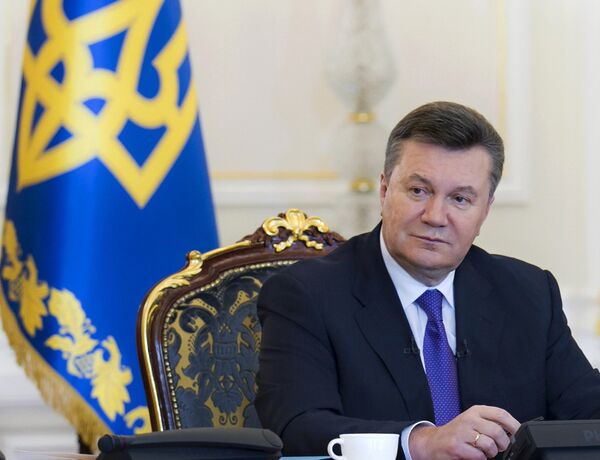MOSCOW, January 17 (RIA Novosti) – Ukrainian President Viktor Yanukovych on Friday signed off on much-criticized anti-protest legislation that that one prominent rights group has dubbed a “charter for oppression.”
The legislation, which has already been described as “undemocratic” by many Western politicians and international organizations, was passed by parliament on Thursday.
The laws are apparently aimed at the thousands of people who have joined ongoing anti-government protests in the capital, Kiev, that were initially ignited in November by Yanukovych's rejection in November of closer economic and political ties with the European Union.
Protesters blocking entrances to government buildings could now face prison time, while a 15-day detention period is envisioned for those taking part in demonstrations not sanctioned by the police, even if peaceful. Fifteen-day jail terms will also be applicable to demonstrators covering their faces with masks or helmets and anybody found to be erecting tents, stages or other makeshift structures without approval from city authorities.
All those conditions appear to describe exactly the activities that have typified the events on Kiev’s Independence Square, where the largely peaceful anti-government demonstrations have been focused.
The legislation approved by Yanukovych also envision up to a year of hard labor in prison for anyone convicted of libel, including on the Internet.
Opponents of this provision have warned of a chilling effect on press freedoms and the likely curtailing in any open criticism of the authorities.
Measures also include new restrictions on Ukrainian NGOs apparently modelled on a similar law passed by Russia earlier this year, restrictions on the Internet and harsher punishments for extremism.
Rights advocacy group Amnesty International has dubbed the legislative package, which was approved almost without discussion by the ruling Party of Regions-dominated parliament, a “charter for oppression.”
“In passing this law the government is halting any progress Ukraine has made over the past twenty years towards full compliance with its international human rights obligations. It promises a grim future for the entire nation,” Amnesty International representative Heather McGill said in a statement.
McGill said the government’s approach suggested it has no interests in negotiating an end to the political stalemate that has blighted the economically struggling former Soviet nation and that it intends instead to provoke an escalation in tensions.
“The government is clearly not interested in dialogue, or ready to hear criticism, but is paving the way for head-on confrontation with a large part of the population of the country,” McGill said.
EU foreign affairs commissioner Catherine Ashton said she was deeply concerned by the way in which the legislation was passed.
“Changes to the judicial code which impose worrying restrictions on the rights of assembly and on the freedom of speech and media, and are contrary to Ukraine's international obligations,” Ashton said in a statement.
Those sentiments were echoed by US Secretary of State John Kerry, who criticized the lack of transparency and accountability shown by parliament in backing the legislation.
“The steps that were taken … are anti-democratic, they’re wrong, they are taking from the people of Ukraine their choice and their opportunity for the future,” Kerry said. “This kind of anti-democratic maneuver is extremely disturbing and should be a concern to every nation that wants to see the people of Ukraine be able to not only express their wish but see it executed through the political process.”
Adds comments from EU Commissioner Catherine Ashton, US Secretary of State John Kerry.


